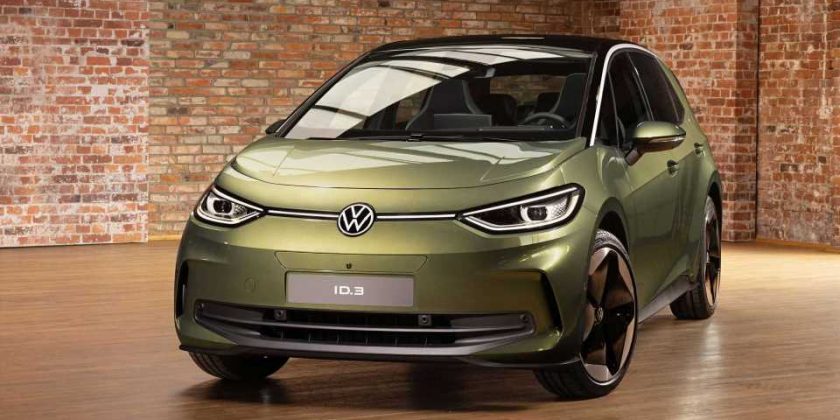Two and a half years after the launch of the Volkswagen ID.3, the automaker has unveiled the facelifted variant of the model that inaugurated its ID family of EVs.
It may not look like it on the outside and inside, but Volkswagen says the 2024 ID.3 has received a comprehensive upgrade, including the latest software with new convenience and assist systems.
From a styling perspective, the changes are very subtle but give the facelifted ID.3 a more striking look. On the outside, the most visible update is the more aggressive front bumper with enlarged air cooling openings.
Other tweaks include new light signatures for the LED headlights and taillight clusters – the taillight segments located in the boot lid are now also illuminated – new aero-optimized alloy wheels, a black roof with matt-silver trim on the edges, and new colors including the Dark Olivine Green iridescent metallic paint.
In addition, the compact electric hatchback’s front hood now appears longer because the black strip under the windshield has been removed, with the recessed sections at the sides creating the same impression.
Moving on to the interior, it looks quite similar to the one in the current model, but Volkswagen says it implemented numerous suggestions from customers. Among other things, the haptic experience has been optimized thanks to improved material quality, including soft, foam-backed surfaces in the cockpit.
Gallery: 2024 Volkswagen ID.3 Facelift
The door panels have been remodeled to include softer and larger surfaces, with more generous hand rests as well. The interior of the ID.3 is now completely animal-free, with a high proportion of recycled materials. For example, the Artvelours Eco microfiber material used on the door trims and seat covers is made of 71 percent recycled plastic waste.
As before, the 2024 VW ID.3 features two free-standing displays, a compact 5.3-inch driver display operated using touch controls on the multifunction steering wheel and a larger 12-inch touchscreen that controls the navigation system, telephone functions, media, assist systems and vehicle settings.
The infotainment system features several changes in the menu structure, such as a clearer, more informative charging menu that is now located on the top level of the main display.
In the connectivity department, the smart Electric Vehicle Route Planner has been updated and improved. For example, on longer journeys it schedules charging stops so that the destination can be reached as quickly as possible, using current traffic information and forecasts in addition to the battery charge level.
The Volkswagen ID.3’s electronic architecture adopts a new concept, using two high-performance computers known as ICAS (In-Car Application Servers) as the main components. These computers solve a number of tasks that are otherwise distributed among a large number of small computers. That said, basic vehicle functions remain on their separate control units.
Updates in the area of assist systems include the use of swarm data in the Travel Assist feature, while Park Assist Plus with memory function allows automatic retrieval and use of saved parking maneuvers.
Same electric motor, battery options, and range ratings
The facelifted ID.3 continues with the same rear-mounted electric drive motor rated at 150 kilowatts (201 horsepower) and 310 Newton-meters (228 pound-feet) of torque. The 58-kWh and 77-kWh battery packs remain available with the same WLTP range ratings.
The larger one enables a range of up to 546 kilometers (339 miles) in the ID.3 Pro S, while the smaller one offers 426 km (264 miles) of range in the ID.3 Pro. Volkswagen said a smaller battery is planned for the future but didn’t provide any details.
At a DC fast-charging station, the 77-kWh battery of the ID.3 Pro S can charge from 5 to 80 percent within 30 minutes at a rate of up to 170 kW. The 58-kWh pack in the ID.3 Pro needs 35 minutes to complete the same charging cycle at 120 kW.
Volkswagen did not say when the facelifted ID.3 will start shipping to customers in Europe, but according to previous reports that will happen in the fourth quarter of 2023.
Source: Volkswagen
Source: Read Full Article


